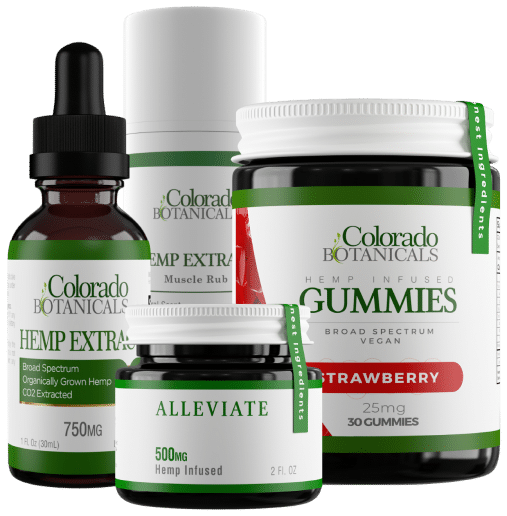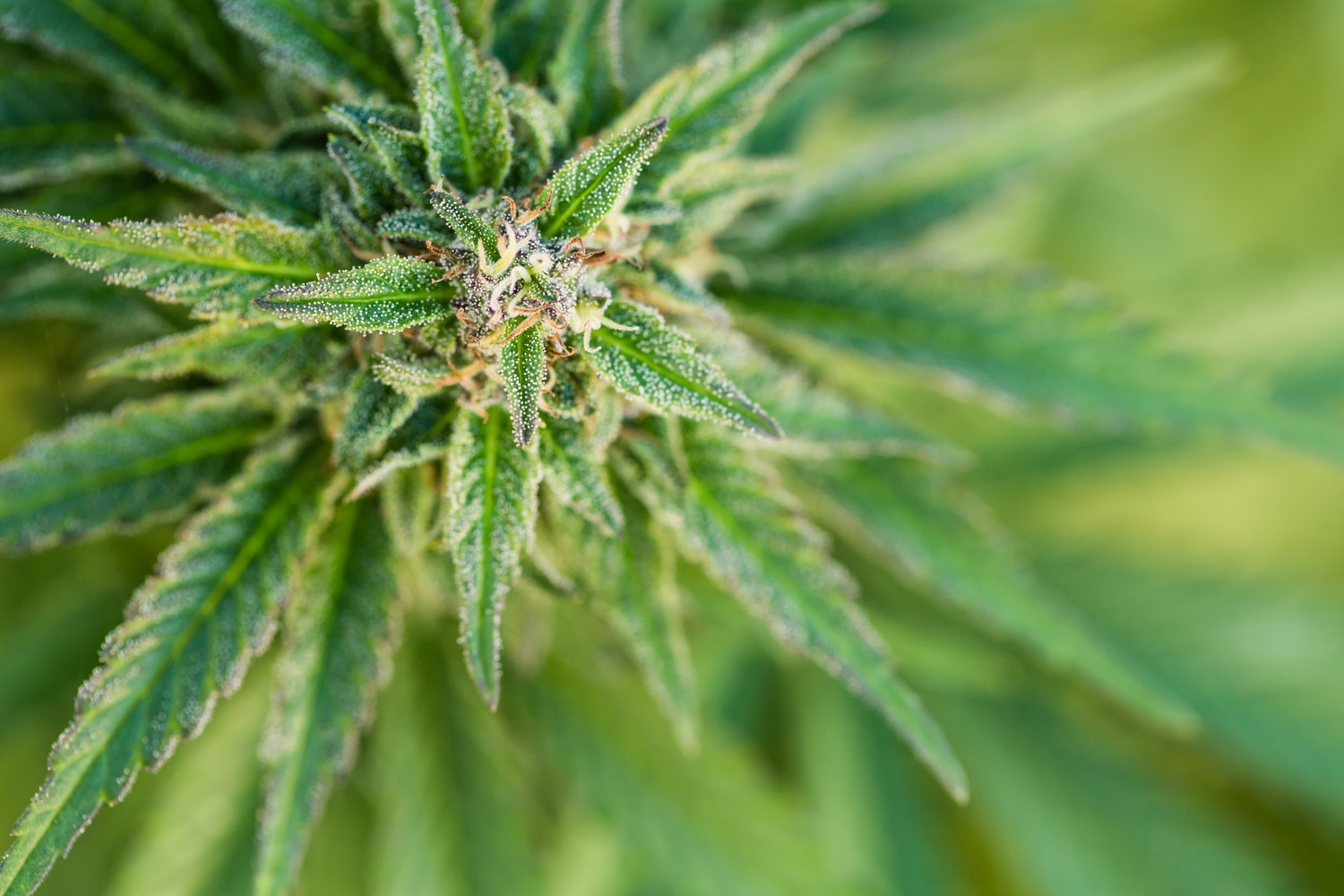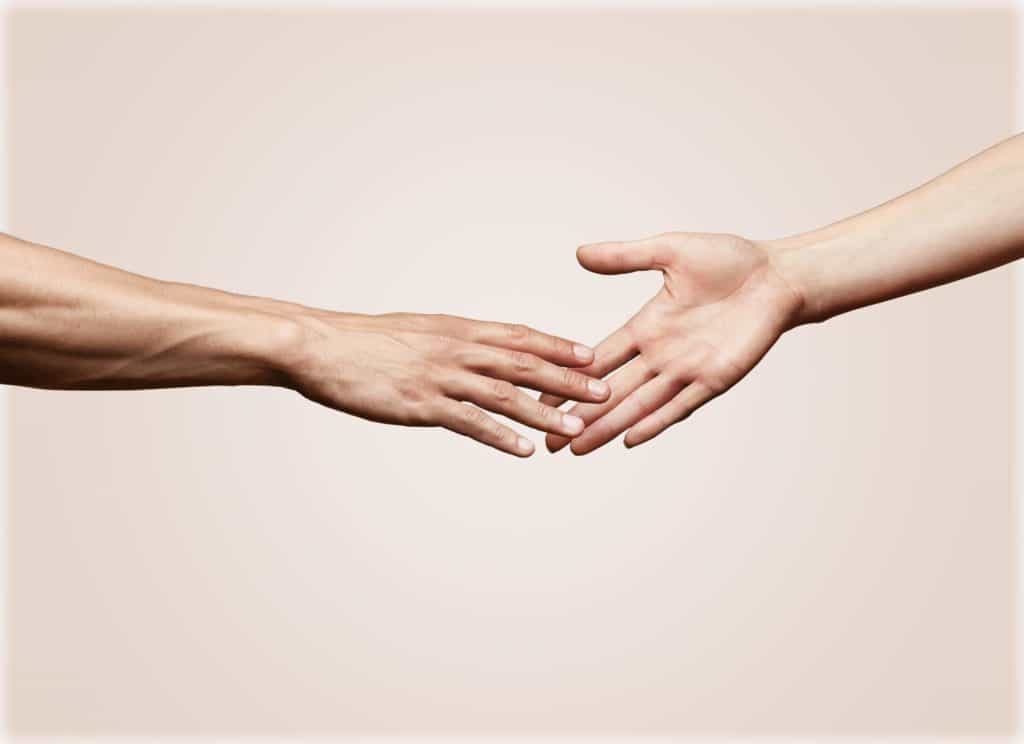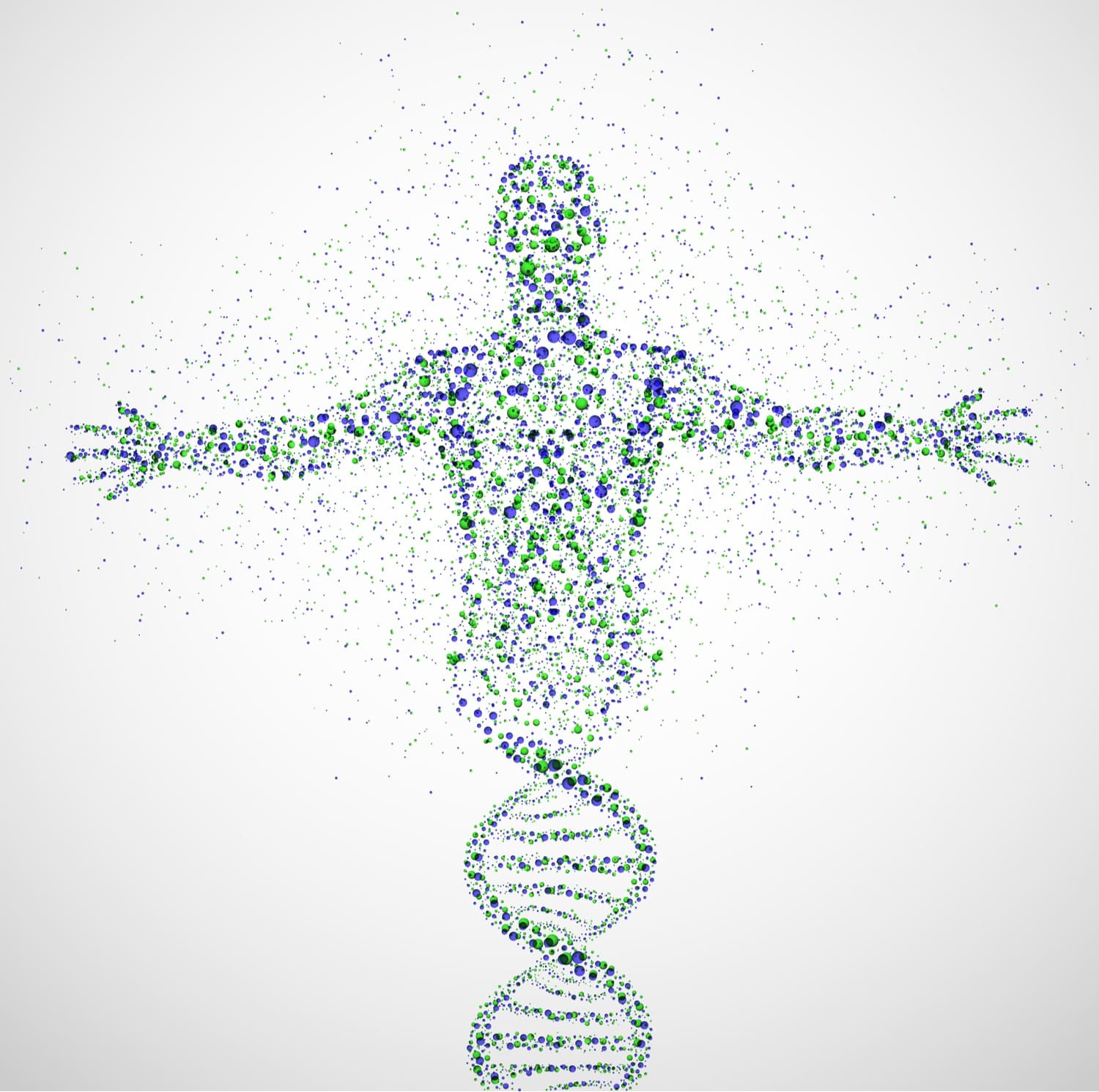According to the Chicago Tribune, coffee is prevalent among Americans. Roughly 80% of Americans drink it – although the source doesn’t specify which are regular, semi-regular, or occasional consumers.
Many people swear by the potential energizing benefits of CBD, so it naturally looks like an excellent addition to your morning pick-me-up. But what happens when you mix CBD with coffee?
So far, CBD isn’t known for severe side effects, but it can interact with other substances – including alcohol and many medications.
We know caffeine is a stimulant, but CBD is unpredictable. For some, CBD is a relaxant, while others find it energizing. Before you mix CBD and coffee, consider the benefits and drawbacks of this unique duo.
What Happens When You Mix CBD and Coffee?
If you’re wondering whether clinical studies using CBD and Starbucks exist, then we’re sorry to disappoint. However, a 2018 study in the Journal of Internal Medicine suggests a connection between the endocannabinoid system (ECS) and coffee.
In short, the ECS is a system of receptors that interact directly or indirectly with internal cannabinoids (endocannabinoids) or external ones (phytocannabinoids).
The researchers note that cannabinoids and coffee act through many similar pathways. Theoretically, this behavior could support or improve the mutual long-term benefits of CBD in your cup of coffee (more on that later).
Although coffee and cannabinoids travel along similar roads, their impacts differ. Experiments showed coffee decreased endocannabinoid transmitter activity. Cannabis, on the other hand, does the opposite.
But does this make CBD and caffeine complete rivals? Not in the least. While the ECS reacts differently to the effects of caffeine or CBD, the mental and physical experience can mirror both substances.
We’ll get into the common advantages of CBD and coffee later. For now, it’s important to understand what ultimately determines those benefits.
Ingredients Make a Difference
Cannabis isn’t just about THC and CBD. Most cannabidiol products contain additional cannabinoids and oily aromatic plant compounds called terpenes. These substances dictate the therapeutic benefits of CBD. To learn more about the impact of terpenes, check out this article.
CBD’s impact also isn’t straightforward. Caffeine is linear – the more you take, the more hyperactive you feel. But CBD is “biphasic,” meaning it follows a curve pattern, peaking at a certain point and then losing potency as dosage climbs.
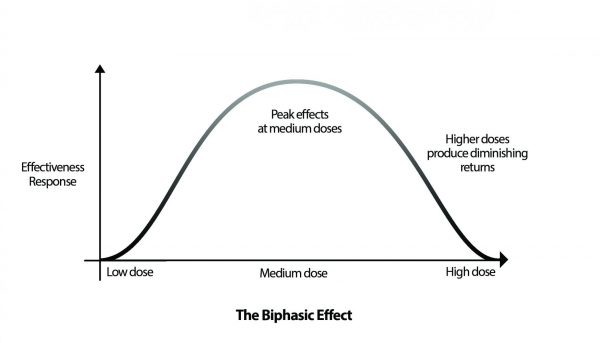
Consequently, the effects of CBD oil or other related products are unpredictable.
CBD Types
Speaking of cannabinoids and terpenes, you need to know the basic CBD types before buying anything. There are three categories based on terpene and cannabinoid content:
- Full-spectrum CBD contains the same terpenes and cannabinoids as its source plant, including up to 0.3% THC.
- Broad-spectrum CBD is similar to full-spectrum, but any THC filters out during processing.
- Isolate is up to 99% pure CBD with all other cannabinoids and terpenes removed (not recommended).
We recommend broad-spectrum since it offers the same benefits as its whole-plant counterpart but without THC. To learn more about why you need other cannabinoids and plant compounds, visit our article on the “entourage effect.”
Dosage Matters
Research continues, but we know so far that low doses and high doses of CBD have opposite effects. The amount of cannabidiol you consume can increase energy and alertness or act as a sedative.
Dr. Bonni Goldstein tells Marie Claire: “It’s unclear at this point in time the exact interaction between CBD and caffeine. At low doses, CBD is a stimulant, and in higher doses, it can cause sedation…Someone’s reaction to a combination of these compounds would not be easily predictable because various doses of each would affect the response.”
In other words, the overall effects depend on how much CBD your body needs – and whether you exceed that.
Benefits of Mixing CBD and Caffeine
It rarely crosses our minds, but caffeine isn’t as benign as we think. The drug is well-accepted, but its damaging effects are established.
Irregular heartbeat, anxiety, insomnia, restlessness, and possibly addiction are a few consequences of short or long-term caffeine consumption.
Interestingly, CBD may offer a solution. Not only does caffeine share some pathways with the endocannabinoid system, but it also metabolizes with the same enzymes as CBD.
The combination helps bring out the best in CBD and coffee.
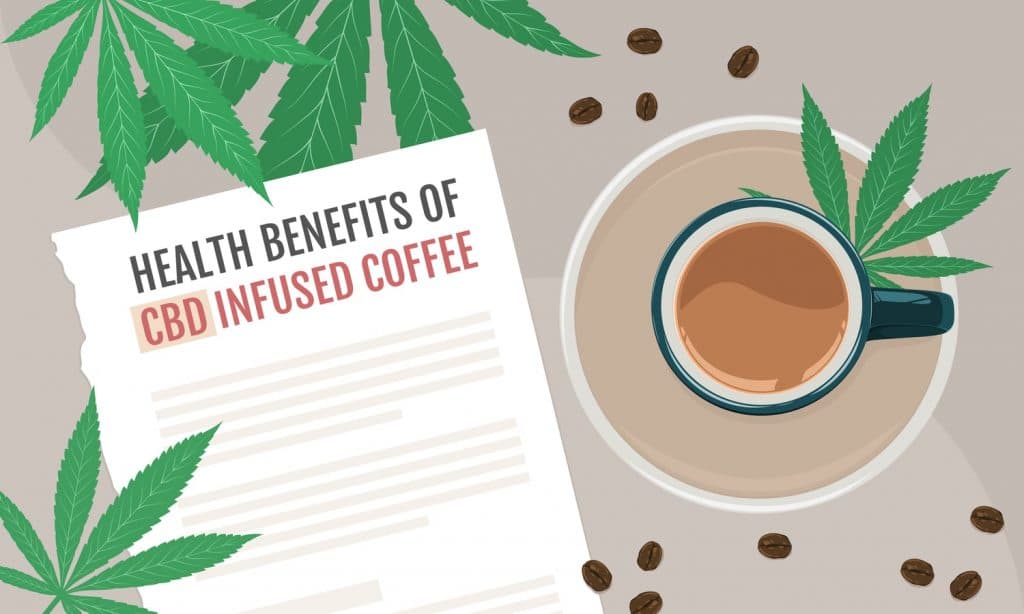
1. Promotes Alertness
Being tired doesn’t just apply to physical exhaustion – although it’s definitely a common symptom. Mental fatigue is as debilitating as physical, with the former often triggering the latter.
Just like a tired body can’t perform its best, a drowsy mind impacts job performance increases stress, hinders communication, and makes every hour feel like a year.
Conventional coping methods include coffee, but some people rely on energy drinks. These sugary beverages are loaded with caffeine, but their effects are short-lived. Within an hour or two, you feel even worse than before.
But as Dr. Goldstein points out earlier, adding a smaller amount of CBD to coffee can amplify its stimulating effects.
2. Extends the Effects of CBD and Caffeine
CBD metabolism is the driving force behind its relationship with caffeine. Again, the drug and CBD share the same metabolic enzymes. So what does this mean? To put it bluntly, this means a heck of a lot.
The conflict creates a bottleneck, as CBD and caffeine compete for the limited room. In turn, this biological traffic jam slows down metabolism, making the effects of CBD and caffeine last longer.
3. No Anxiety or Jitters
For many, caffeine’s side effects can be too much to handle. Anxiety, jitteriness, hyperactivity, and rapid heart rate are some examples that people prefer to avoid. Unfortunately, it can be a tough position for people who just want one or two cups of coffee a day.
Some simply choose to deal with the jitters and other side effects, but that just sets them up for long-term caffeine-related health issues.
But surprised coffee drinkers often say CBD reduced or prevented caffeine’s unpleasant complications.
4. Fewer Bathroom Trips
Does coffee send you to the bathroom seemingly the second you swallow it? You’re not alone. Caffeine is a diuretic, so your body expels it quickly. It increases urination and also irritates your intestinal lining, possibly leading to diarrhea.
Diarrhea occurs due to an inflammatory intestinal response, which prevents the digestive system from absorbing liquid. Coffee works the same way, which is why many people use it to stay regular.
Research on CBD seems promising. A 2016 study in Expert Review of Gastroenterology and Hepatology notes that cannabinoids could be promising for patients with chronic inflammatory bowel diseases (IBDs).
It’s possible that adding CBD to coffee or other caffeinated drinks may help reduce the inflammatory response and prevent diarrhea.
5. Adds Amazing Health Benefits
Although we’re discussing CBD and caffeine, don’t let that cause tunnel vision. Cannabinoids and coffee are just the beginning.
Covering all the suspected advantages would be impossible, but CBD reportedly may help against pain, insomnia, inflammation, anxiety, depression, nausea, and seizures.
Adding CBD also promotes homeostasis – a state of internal balance to ensure the body and mind work properly.
What Coffee Lovers Say About CBD Oil and Caffeine
CBD and coffee may not be on the front page of science journals but seem to be at the front of people’s minds. The niche nature of CBD coffee (or the practice of mixing them) means independent reviews are hard to come by. But Reddit once again pulls through.
According to Reddit user u/juansantona:
“I don’t really feel any crazy difference from CBD in [sic] its own, but when I mix it with coffee, it takes away the dread and the feeling of being strung out. I very highly recommend [it] for anyone who loves coffee but is sensitive to caffeine.”
Below, u/gooslim adds:
“I’ve tried CBD cold brew. It works. It wakes you up, but you feel more focused and less shaky or jittery.”
Side Effects of Mixing CBD Oil With Coffee
We don’t have any research available addressing the side effects of mixing CBD oil with coffee. According to Global Health and Pharma Magazine, cannabidiol and caffeine combined won’t trigger any unpleasant reactions.
However, CBD and coffee have side effects of their own. Any of these could still materialize to different degrees. Ideally, CBD prevents anxiety and hyperactivity from caffeine. But as we mentioned earlier, ingredients and dosage matter.
We’ve discussed caffeine’s complications, but CBD has a few of its own. They’re typically mild and temporary, including:
- Drowsiness
- Headache
- Nausea
- Dizziness
- Diarrhea
- Appetite changes
Choose the right product and dose carefully to reduce the chances of side effects from caffeine or CBD.
How to Make CBD-Infused Coffee
You can upgrade your cups of coffee in two ways. The first option is to buy CBD coffee from a local or online vendor. But there’s a simpler, cheaper solution if you have some CBD products on hand.
CBD Oil
Broad-spectrum and full-spectrum CBD oils are more potent than isolate for combining CBD with coffee.
Use the dropper to add a premeasured dose to your coffee. Ideally, you’ll notice alertness and energy without any jitters or psychoactive effects.
However, CBD oil has an earthy cannabis taste, which offsets the coffee’s flavor.
Isolate Powder or Tincture
Since isolate is pure CBD, all of the aromatic terpenes are gone. This seriously impacts potency but also opens up other opportunities.
For instance, CBD powder and tincture combine well with food and drinks. They’re also flavorless, meaning you’ll enjoy CBD without a “hempy” taste.
Like its full and broad-spectrum cousins, just place the desired dose of isolate into your coffee and stir.
Other CBD Products
You don’t have to make CBD coffee to consume CBD with caffeine – even though it’s arguably the best option. But if you’re not a fan of mixing CBD oil with your chosen roast, you can always get your cannabidiol from other sources.
Colorado Botanicals, one of the leaders in the CBD industry, carries a wide variety of CBD products, including broad-spectrum CBD gummies and CBD softgels that you can take with your morning coffee.
But is it safe, effective, or any different from CBD coffee? Let’s look at some common options.
Can I take Caffeine Pills with CBD Oil?
Yes, you can take caffeine pills with CBD oil. The effects will be identical to consuming CBD with coffee.
Can I Vape CBD and Drink Morning Coffee?
Yes, you can vape CBD and drink morning coffee. However, vaped CBD doesn’t pass through the liver. Consequently, its effects are short-lived compared to CBD oil.
Summary: CBD and Coffee Takeaways
Given the beverage’s popularity, it makes sense to create CBD-infused coffee. Not all substances mix well with cannabidiol, but caffeine and CBD seem to get along.
Arguably the biggest advantage of CBD-infused coffee is its natural counterbalance. If you mix CBD and coffee, odds are you’ll experience all the benefits without the unpleasant side effects of caffeine.
So next time you want some CBD in your cup of coffee, don’t think twice. Not only do you get a better caffeine-like effect, but you support your health in the process.
Sources
AI Global Media. (n.d.). Things You Need to Know About Cbd and Coffee. Global Health & Pharma. Retrieved September 9, 2021, from https://www.ghp-news.com/things-you-need-to-know-about-cbd-and-coffee/.
Cornelis, M. C., Erlund, I., Michelotti, G. A., Herder, C., Westerhuis, J. A., & Tuomilehto, J. (2018). Metabolomic response to Coffee consumption: Application to a three-stage clinical trial. Journal of Internal Medicine, 283(6), 544–557. https://doi.org/10.1111/joim.12737
Drell, C. (2018, August 16). How Hard Should We Lean into This Whole Cbd Coffee Trend? Marie Claire. https://www.marieclaire.com/health-fitness/a22730075/cbd-oil-in-coffee/.
Hasenoehrl, C., Storr, M., & Schicho, R. (2017). Cannabinoids for treating inflammatory bowel diseases: Where are we and where do we go? Expert Review of Gastroenterology & Hepatology, 11(4), 329–337. https://doi.org/10.1080/17474124.2017.1292851
Schumacher, M. (2020, May 29). What are the Benefits of Mixing Cbd and Coffee? Chicago Tribune. Https://www.chicagotribune.com/Marijuana/Sns-Benefits-of-Mixing-Cbd-Coffee-20200529-twtozpiba5advdz4yz76a7kwfm-Story.html.
U.S. National Library of Medicine. (2021, July 2). Caffeine. MedlinePlus. Retrieved September 9, 2021, from https://medlineplus.gov/caffeine.html.



